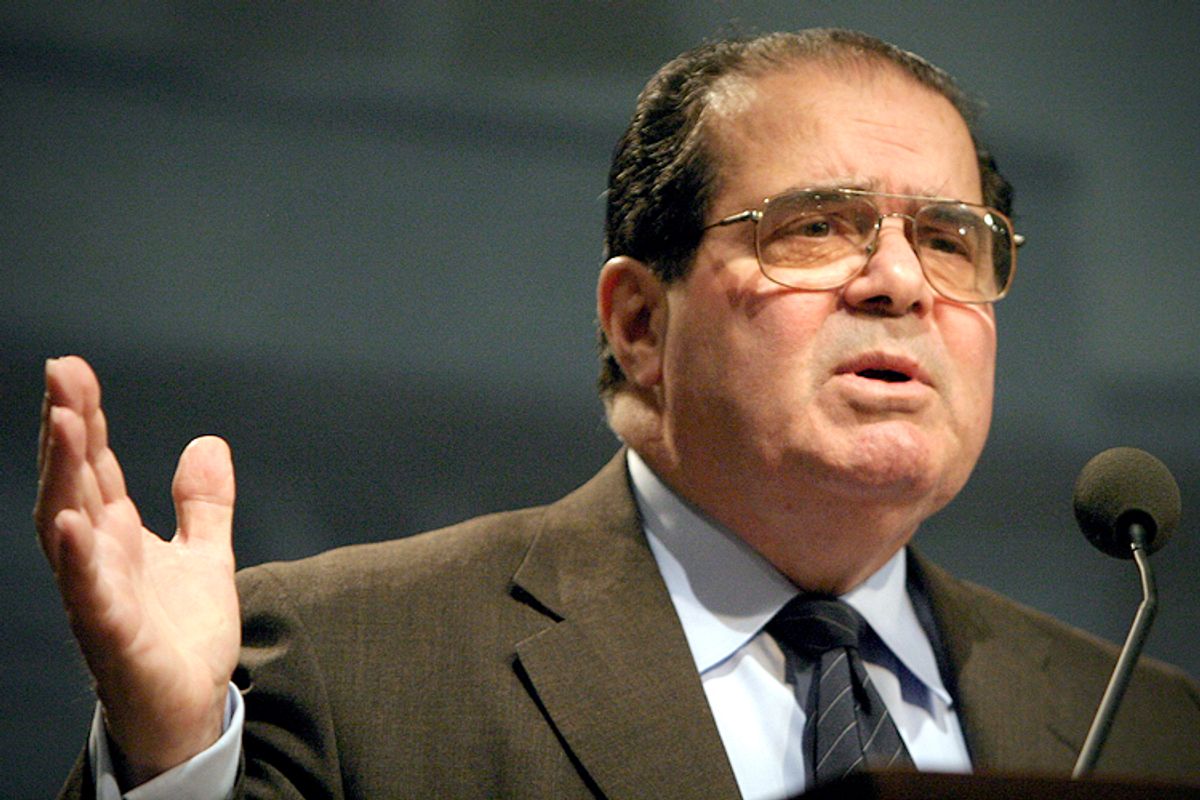Antonin Scalia cast the deciding vote to bring same-sex marriage to California. And nobody noticed.
In Hollingsworth v. Perry, the Supreme Court held that the proponents of Proposition 8, which banned same-sex marriage in California, did not have standing to appeal a district court order invalidating the ban. As a result, the order went into effect, and California immediately started issuing marriage licenses to same-sex couples. The result was surprising to some lawyers. The district judge exceeded his authority: Outside of class action suits, judges generally don’t have the power to issue orders protecting people who aren’t parties to the case before them. But there wasn’t a word in the Court’s opinion limiting the remedy to the two couples before the Court.
The alliances were unusual. Chief Justice John Roberts wrote the 5-4 decision, joined by Scalia, Ruth Bader Ginsburg, Steven Breyer and Elena Kagan. The dissenters, Anthony Kennedy, Clarence Thomas, Samuel Alito and Sonya Sotomayor, thought the Court should decide the issue, though they surely would have split on the result.
So here’s the puzzle. Why did Scalia, who has angrily dissented from every gay rights victory in the Supreme Court, join Roberts’ decision without protest? And why are conservatives not screaming at him for doing that?
Scalia’s vote is the most mysterious of the nine. Ginsburg, Breyer and Kagan are liberal justices who are probably friendly to same-sex marriage, though Ginsburg’s publicly expressed doubts about Roe v. Wade suggest that she may be reluctant to try to resolve that issue for the whole country. Roberts is a pro-business conservative whose views on gay rights are unknown. But why didn’t Scalia at least write a separate opinion, pointing out that the district court’s order was improperly broad?
Nobody knows. But here’s a theory that is at least consistent with what we do know.
It takes only four votes for the Court to agree to hear a case. The decision to hear this one probably came from the conservatives, Roberts, Scalia, Alito and Thomas, who hoped to overturn the district court’s order. But at the same time, the challenge to the Federal Defense of Marriage Act, which denies all recognition to same-sex couples, was before the Court. And the decision, written by swing vote Kennedy, included some language, unnecessary to the result, very sympathetic to same-sex marriage. So Roberts and Scalia retreated. The holding on standing vacates all the appeals and reinstates the district court’s order, but it saves the Supreme Court from having to decide whether same-sex couples have a right to marry everywhere in the United States. For their own reasons, Ginsburg, Breyer and Kagan were happy to postpone consideration of that explosive issue. (A mystery that I can’t explain: Why couldn’t Roberts get Thomas and Alito to join that sensible retreat? Why would Thomas and Alito want to force a battle they were going to lose?)
Roberts’ opinion could easily have included some language casually noting in passing that the district court’s decision properly applies only to the two couples who brought the suit, and that the more general question was not within the district court’s jurisdiction. (Even if there was no standing to appeal, Roberts was not obligated to describe without comment an overbroad injunction.) He could then direct further proceedings in the 9th Circuit consistent with this opinion. That would have forced the lower courts to refashion the injunction to have nearly no effect.
So why didn’t Scalia insist on that?
Suppose that Roberts’ first draft of his opinion did contain that language. Then Ginsburg, Breyer and Kagan threaten to write separately (and maybe even circulate a draft), leaving Roberts with only two votes for his opinion (which would then not be the principal opinion for the Court). Their separate opinion might have gone in many different directions, many of which would still have left the big marriage question unresolved. Had they reached the merits, a bold right to marry opinion might even have gotten five votes. Or a fractured Court would have reached no coherent result, given the lower court no clear direction, and made Roberts look like a terrible leader. Keeping the liberals on board avoids that result.
So the price of joining Roberts’ opinion is that the language comes out and same-sex marriage comes to California. Scalia hates, hates, hates it, but he understands that he has to hold his nose and go along.
The last mystery is why conservative commentators have not fallen onto Scalia with the kind of viciousness that Roberts was subjected to after the Obamacare case. Like Roberts, he joined an opinion allowing something to happen that they had been fighting for years. Yet in the weeks following the opinion, there’s not been a breath of criticism. My guess is that Republicans have figured out that this issue isn’t a winner for them anymore, and so there’s no point in bellyaching about it now. That’s the best news of all for proponents of marriage equality.



Shares